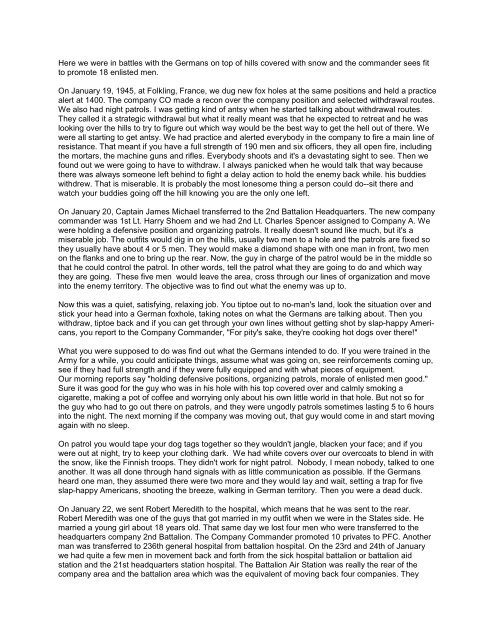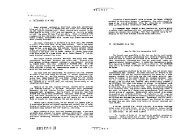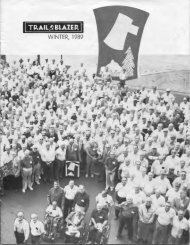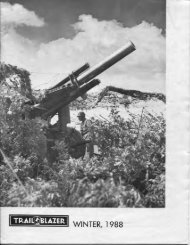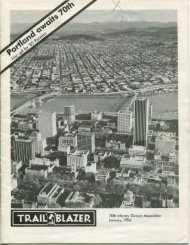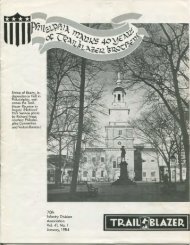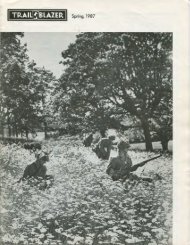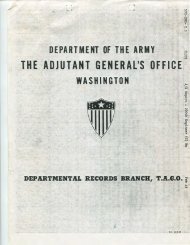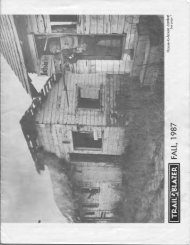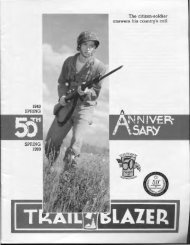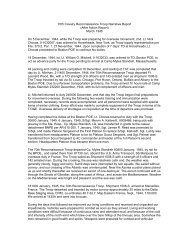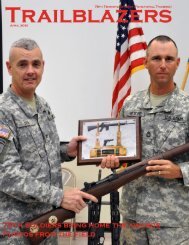Download - 70th Infantry Division Association
Download - 70th Infantry Division Association
Download - 70th Infantry Division Association
Create successful ePaper yourself
Turn your PDF publications into a flip-book with our unique Google optimized e-Paper software.
Here we were in battles with the Germans on top of hills covered with snow and the commander sees fit<br />
to promote 18 enlisted men.<br />
On January 19, 1945, at Folkling, France, we dug new fox holes at the same positions and held a practice<br />
alert at 1400. The company CO made a recon over the company position and selected withdrawal routes.<br />
We also had night patrols. I was getting kind of antsy when he started talking about withdrawal routes.<br />
They called it a strategic withdrawal but what it really meant was that he expected to retreat and he was<br />
looking over the hills to try to figure out which way would be the best way to get the hell out of there. We<br />
were all starting to get antsy. We had practice and alerted everybody in the company to fire a main line of<br />
resistance. That meant if you have a full strength of 190 men and six officers, they all open fire, including<br />
the mortars, the machine guns and rifles. Everybody shoots and it's a devastating sight to see. Then we<br />
found out we were going to have to withdraw. I always panicked when he would talk that way because<br />
there was always someone left behind to fight a delay action to hold the enemy back while. his buddies<br />
withdrew. That is miserable. It is probably the most lonesome thing a person could do--sit there and<br />
watch your buddies going off the hill knowing you are the only one left.<br />
On January 20, Captain James Michael transferred to the 2nd Battalion Headquarters. The new company<br />
commander was 1st Lt. Harry Shoem and we had 2nd Lt. Charles Spencer assigned to Company A. We<br />
were holding a defensive position and organizing patrols. It really doesn't sound like much, but it's a<br />
miserable job. The outfits would dig in on the hills, usually two men to a hole and the patrols are fixed so<br />
they usually have about 4 or 5 men. They would make a diamond shape with one man in front, two men<br />
on the flanks and one to bring up the rear. Now, the guy in charge of the patrol would be in the middle so<br />
that he could control the patrol. In other words, tell the patrol what they are going to do and which way<br />
they are going. These five men would leave the area, cross through our lines of organization and move<br />
into the enemy territory. The objective was to find out what the enemy was up to.<br />
Now this was a quiet, satisfying, relaxing job. You tiptoe out to no-man's land, look the situation over and<br />
stick your head into a German foxhole, taking notes on what the Germans are talking about. Then you<br />
withdraw, tiptoe back and if you can get through your own lines without getting shot by slap-happy Americans,<br />
you report to the Company Commander, "For pity's sake, they're cooking hot dogs over there!"<br />
What you were supposed to do was find out what the Germans intended to do. If you were trained in the<br />
Army for a while, you could anticipate things, assume what was going on, see reinforcements coming up,<br />
see if they had full strength and if they were fully equipped and with what pieces of equipment.<br />
Our morning reports say "holding defensive positions, organizing patrols, morale of enlisted men good."<br />
Sure it was good for the guy who was in his hole with his top covered over and calmly smoking a<br />
cigarette, making a pot of coffee and worrying only about his own little world in that hole. But not so for<br />
the guy who had to go out there on patrols, and they were ungodly patrols sometimes lasting 5 to 6 hours<br />
into the night. The next morning if the company was moving out, that guy would come in and start moving<br />
again with no sleep.<br />
On patrol you would tape your dog tags together so they wouldn't jangle, blacken your face; and if you<br />
were out at night, try to keep your clothing dark. We had white covers over our overcoats to blend in with<br />
the snow, like the Finnish troops. They didn't work for night patrol. Nobody, I mean nobody, talked to one<br />
another. It was all done through hand signals with as little communication as possible. If the Germans<br />
heard one man, they assumed there were two more and they would lay and wait, setting a trap for five<br />
slap-happy Americans, shooting the breeze, walking in German territory. Then you were a dead duck.<br />
On January 22, we sent Robert Meredith to the hospital, which means that he was sent to the rear.<br />
Robert Meredith was one of the guys that got married in my outfit when we were in the States side. He<br />
married a young girl about 18 years old. That same day we lost four men who were transferred to the<br />
headquarters company 2nd Battalion. The Company Commander promoted 10 privates to PFC. Another<br />
man was transferred to 236th general hospital from battalion hospital. On the 23rd and 24th of January<br />
we had quite a few men in movement back and forth from the sick hospital battalion or battalion aid<br />
station and the 21st headquarters station hospital. The Battalion Air Station was really the rear of the<br />
company area and the battalion area which was the equivalent of moving back four companies. They


